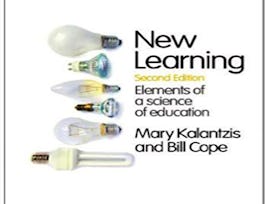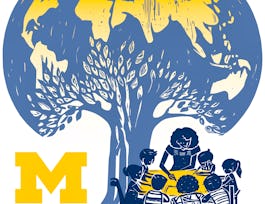What role does education play in achieving sustainable development goals? How can education drive transformative changes leading to environmentally and socially just societies? How can key stakeholders be involved in creating inclusive, equitable, and empowering learning environments that prepare individuals and communities for a rapidly changing world?



Reimagining Education for Equity


Instructors: Professor Poonam Batra
Sponsored by Coursera Learning Team
Recommended experience
What you'll learn
Understand India's education policy trajectory
Problematise the role of education in sustaining social inequalities
Deliberate on how education can be transformed to attain equitable, just, and sustainable futures
Details to know

Add to your LinkedIn profile
6 assignments
July 2024
See how employees at top companies are mastering in-demand skills


Earn a career certificate
Add this credential to your LinkedIn profile, resume, or CV
Share it on social media and in your performance review

There are 7 modules in this course
In this introductory module, you will learn a few important details about the course, including the objectives of this course, who the instructors and the course team are, as well as important information to navigate the course. You will also find a link to a Pre-Course Survey – please do fill this as it will help us get to know you better and prepare the course accordingly.
What's included
1 video3 readings1 discussion prompt1 plugin
In this module, you’ll become familiar with the development of the education system from Colonial India to Independent India and the continued impact of policy trajectories on school and teacher education. You will also have the opportunity to reflect on the potential role of teachers in achieving high-quality education.
What's included
4 videos1 reading1 assignment2 discussion prompts
By the end of this module, you would develop some insight into how the concept of childhood evolved and how this understanding is critical to designing school curriculum and pedagogy. Engaging with the progression of the Right to Education Act would help in understanding how children’s rights are sought to be met in a plural and hierarchised society and how the role and accountability of the state is critical in safeguarding children's rights and their well-being.
What's included
6 videos1 reading1 assignment3 discussion prompts
This module helps you recognise children as epistemic entities and the importance of encouraging children’s voice and agency in achieving their true potential. This module will assist you in cultivating capacities and dispositions to appreciate the diversity of children’s backgrounds and to integrate their lived experiences in the teaching-learning process.
What's included
7 videos1 reading1 assignment3 discussion prompts
In this module, you will develop tools and capacities to understand, engage with and integrate diverse lived experiences of students in the teaching and learning process. You will be able to understand how formal schooling processes, communities, larger social and political contexts facilitate or hinder the inclusion of children in classrooms.You would also engage with ideas of decolonising school curriculum as part of a wider project of ‘decoloniality’ which implies dismantling relations of power and conceptions of knowledge that tend to reproduce hierarchies based on caste, gender, class, community, and region.
What's included
8 videos1 reading1 assignment3 discussion prompts
This module of the course offers you opportunities to reflect upon the nuanced and deep influence that socio-cultural structures of class, caste, and community have on gender and how classroom pedagogy can be reinvented to equip teachers to become sensitive and socially responsive to the unequal nature of gender and to seek transformative pedagogies.
What's included
6 videos1 reading1 assignment3 discussion prompts
In this final module, you will get the opportunity to check your understanding of all that you've learnt so far with the graded assessment in the form of a multiple-choice questionnaire. You will also hear from our instructors on what they hope the ideal key takeaways are for you from this course. Finally, please fill in the Post-course Survey – this will help us understand your journey during the course and improve it to make learning more meaningful.
What's included
1 video1 assignment1 plugin
Instructors


Offered by
Why people choose Coursera for their career




Recommended if you're interested in Social Sciences

University of Illinois Urbana-Champaign

University of Michigan

University of Michigan

The University of Edinburgh

Open new doors with Coursera Plus
Unlimited access to 10,000+ world-class courses, hands-on projects, and job-ready certificate programs - all included in your subscription
Advance your career with an online degree
Earn a degree from world-class universities - 100% online
Join over 3,400 global companies that choose Coursera for Business
Upskill your employees to excel in the digital economy


